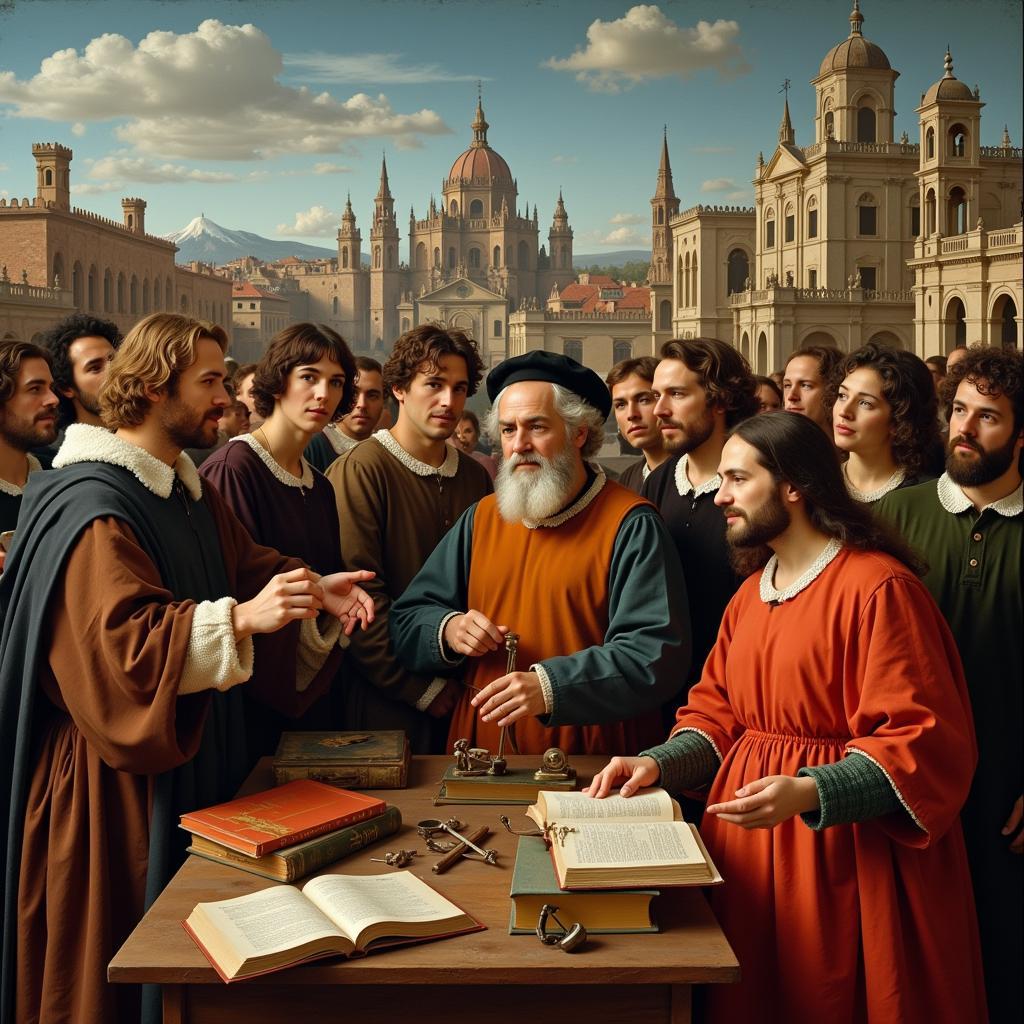The Renaissance, a period of immense cultural and intellectual transformation, significantly reshaped European society. One key change, among many, was the shift from a primarily religious worldview to a more human-centered one, often referred to as humanism. This shift impacted everything from art and literature to science and politics, laying the groundwork for the modern world we know today. This article will explore the rise of humanism and its profound effects on Renaissance society, examining how it altered perspectives, fostered creativity, and ultimately changed the course of history.
 Renaissance Humanism's Impact on Society
Renaissance Humanism's Impact on Society
The Rise of Humanism: A New Focus on Humanity
During the Middle Ages, European thought was largely dominated by the Church. Life revolved around religious doctrines, and the afterlife was the primary focus. The Renaissance, however, saw a revival of interest in classical Greek and Roman texts, which emphasized human potential and achievement. This renewed focus on human reason, ethics, and earthly experience became the cornerstone of humanist philosophy. Humanists believed in the power of education and the importance of developing well-rounded individuals. They studied the humanities—grammar, rhetoric, poetry, history, and moral philosophy—to cultivate critical thinking and eloquence. This emphasis on human capabilities challenged the prevailing medieval mindset and paved the way for groundbreaking advancements in various fields.
How did this new focus on humanity change society? One fundamental way was by encouraging individuals to question traditional authorities and pursue knowledge independently. This spirit of inquiry fueled scientific discoveries, artistic innovations, and new political ideas. It fostered a sense of individual agency and responsibility, empowering people to shape their own destinies and contribute to society in meaningful ways.
Humanism’s Impact on Art, Literature, and Science
Humanism’s influence was particularly evident in the flourishing of art, literature, and science during the Renaissance. Artists like Leonardo da Vinci and Michelangelo celebrated the human form and explored human emotions with unprecedented realism and depth. Writers such as Shakespeare and Machiavelli delved into the complexities of human nature, crafting timeless stories that continue to resonate with audiences today. Scientists like Copernicus and Galileo challenged long-held beliefs about the universe, making groundbreaking discoveries that revolutionized our understanding of the cosmos.
How Old Were Girls When They Entered Society? A Shift in Social Norms
The Renaissance also witnessed a shift in social norms, including changing expectations for women. While women still faced limitations, humanism provided some with opportunities for education and intellectual pursuits. This wasn’t a widespread phenomenon, but it marked a departure from the more restrictive roles traditionally assigned to women in medieval society. To understand more about the changing roles of young women in this era, you might find the article “how old were girls when they entered society” insightful.
From Religious Dogma to Critical Thinking: What Was One Way the Renaissance Changed Society?
The shift from religious dogma to critical thinking was arguably the most significant way the Renaissance changed society. By embracing human reason and empirical observation, Renaissance thinkers laid the foundation for the scientific revolution and the Enlightenment. This new emphasis on critical inquiry led to a questioning of established hierarchies and a greater emphasis on individual freedom and autonomy.
Dr. Eleanor Ainsworth, a renowned Renaissance historian, notes, “Humanism’s emphasis on individual potential empowered people to question the status quo and seek their own truths. This marked a profound shift in the social fabric of Europe.”
Did Humanism entirely replace religious belief?
While humanism challenged the Church’s authority, it didn’t necessarily eliminate religious belief. Many humanists remained devout Christians, seeking to reconcile their faith with their newfound appreciation for human reason and earthly experience. This tension between faith and reason would continue to shape intellectual debates for centuries to come.
Professor Thomas Moreland, a philosopher specializing in Renaissance thought, adds, “The Renaissance wasn’t a complete rejection of religion, but rather a re-evaluation of its role in human life. Humanists sought to integrate faith and reason, creating a more balanced and holistic worldview.”
Conclusion: The Enduring Legacy of the Renaissance
The Renaissance, with its emphasis on humanism, profoundly changed society by fostering a new appreciation for human potential, promoting critical thinking, and sparking groundbreaking advancements in art, literature, and science. What Was One Way The Renaissance Changed Society? The rise of humanism undeniably reshaped the intellectual and cultural landscape of Europe, leaving an enduring legacy that continues to shape our world today.
FAQ
- What is humanism?
- How did humanism influence Renaissance art?
- What role did classical texts play in the Renaissance?
- How did the Renaissance impact scientific thought?
- What were some of the key figures of the Renaissance?
- How did the Renaissance change society’s view of women?
- What is the lasting legacy of the Renaissance?
Further Exploration
For more insights into the impact of the Renaissance on society, explore these additional resources on our website:
If you require further assistance or have specific questions, please don’t hesitate to contact us. Call us at 02043854663, email us at [email protected], or visit us at Khu 34, Bắc Giang, 260000, Việt Nam. Our customer service team is available 24/7.